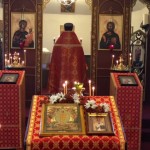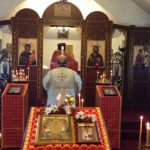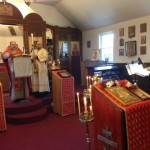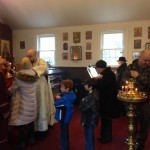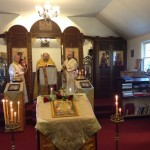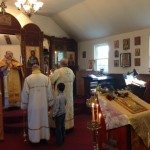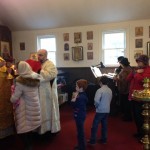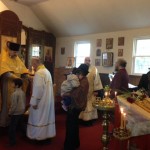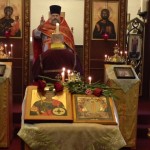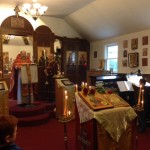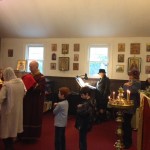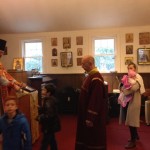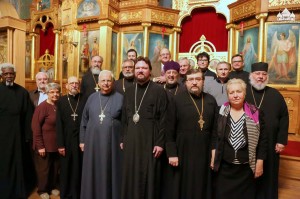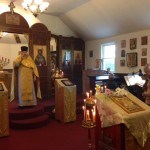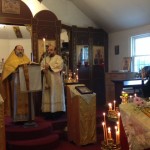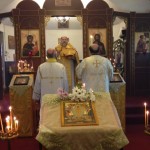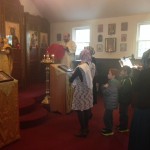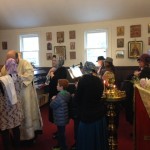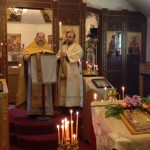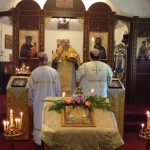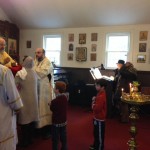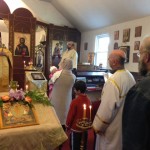On November 30, on the 25th Sunday after Pentecost St. George Church’s Rector, Archpriest Igor Tarasov served the Divine Liturgy. Following the Gospel lesson he preached a homily in the Russian language. The English translation of that homily is the following:
“Today we listened to a pretty brief Gospel reading about a rich man who was a fool because he put all his trust in his possessions rather than in God. He laid treasures for himself, instead of becoming rich toward God. So this is a parable our Lord wished to use to teach us how important is to grow our treasures in heaven, not on earth.”
“Among all kinds of opportunities and privileges a man has in his earthly life is a right to own. We have a right to have property. Some people have a lot in their possession, some people have very few. But we all have an ability and natural right to own things. Those things belong to us although, and we have to realize it, they may not belong to us forever. Either we survive them or they survive us. And if they survive us, we no longer possess them. We are not able to take them along when we die. Thus this right is temporary and it is a gift from God. God gives us such right very generously. And we should see that right as an opportunity to give it away. Archbishop John (Shakhovskoy) said, “The ownership is beautiful only because you can give it away, make a gift, take it off. A man needs to have something in order to have a right and joy to share it, to give it.” Thus the sense of ownership seems to be created to help us to fulfill the God’s will, to help the others.”
“We have to admit that such attitude toward the sense of ownership is not always practiced. People may often be in a slavery of greed and avarice. Those are the mortal sins. The right sense of ownership which urges us to share has to be taught. We have to learn this right attitude. Therefore, our Lord wished to give us a colorful example of how a person with a wrong sense of ownership ends up. He ends up to be called a fool. And, on the contrary, people who had possessions but shared them with others were blessed and are considered wise. They gather their treasures in heaven and get rich toward God.”
“The world is full of the examples of rich fools and wise people who share. Many contemporary politicians lead their nations into bloody wars for their personal gains or in order to strengthen the positions of their parties, groups and clans. If they succeed through sacrificing many human lives, that kind of success will not help them in the eternal life. What they accomplished to benefit themselves will not follow them into eternal life.”
“Also in many Church communities, in many parishes some people do not wish to share their wealth with the parish. They could expect more than they were given. Now many parishes are facing the end of their life, but some of them now blame others but not themselves. What they earned during lifetime will not follow them into eternity, but what they could have done for this church would.”
“It is better to give than to receive,” – says St. Paul. And this is a motto of those who having wealth, or just having something, give it to the others, share with the others. Thanks to them we have a lot of things accomplished around us. These are the riches which make their owners wise and blessed by God. St. Paul says: “Let each one give as he purposes in his heart, not grudgingly or of necessity; for God loves a cheerful giver.”(2 Cor. 9,7).”
“Dear brother and sisters! Thus let us learn to have a right attitude and sense of ownership and let us put our trust in God, so any unexpected thing will not find us unprepared, but we will acquire a treasure earned in eternity.”
Following the Liturgy dismissal the Rector briefly explained in English his previously preached homily. He also reminded parishioners of the Nativity Fast which began on November 28. The Rector stressed that this fast is especially calling us to be generous in almsgiving and helping the needy. Christmas season is about giving and sharing.
Fr. Igor also called the parishioners to practice spiritual life. “Of course, nowadays we do not encounter such great champions of faith as it was long ago. Today, for instance, the Church commemorates St. Gregory the Wonderworker. When he came to be a bishop in his city of Neocaesarea, there were only 17 Christians living there. But when he died only 17 non-Christians remained in that city. We cannot hope that we could do the same. Now we gather here in this church and sometimes there are 17 of us. Sometimes, like today, it is even less. We cannot hope that after us there will be only 17 non-Orthodox in Bayside! But at least, we can do something to make our parish live and to make it grow at least a little. Our spiritual and active Christian life may help us to achieve such a goal,” – said Fr. Igor.
After the service the Rector and parishioners enjoyed delicious meals and a good company at the coffee hour.

